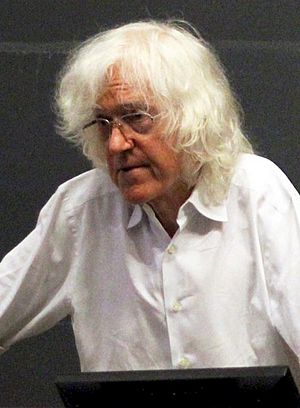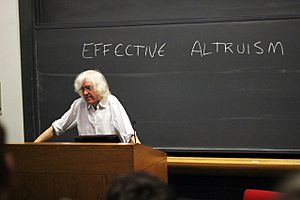Derek Parfit facts for kids
Quick facts for kids
Derek Parfit
|
|
|---|---|

Parfit at Harvard University in April 2015
|
|
| Born | 11 December 1942 Chengdu, China
|
| Died | 2 January 2017 (aged 74) London, England, UK
|
| Education | Eton College Balliol College, Oxford (B.A., 1964), Columbia University |
| Spouse(s) |
Janet Radcliffe Richards
(m. 2010) |
| Awards | Rolf Schock Prize in Logic and Philosophy (2014) |
| Era | Contemporary philosophy |
| Region | Western philosophy |
| School | Analytic philosophy |
|
Main interests
|
|
|
Notable ideas
|
|
|
Influences
|
|
|
Influenced
|
|
Derek Antony Parfit (1942–2017) was a British philosopher. He was known for his deep thinking about who we are as people, how we should make choices, and what is right or wrong. Many people consider him one of the most important moral philosophers of his time.
Parfit became well-known in 1971 with his first paper, "Personal Identity." His first book, Reasons and Persons (1984), is seen as a major work in moral philosophy. His second book, On What Matters (2011), was talked about for many years before it was even published.
He spent his whole career at Oxford University in England. He was also a visiting professor at top universities like Harvard University and New York University. In 2014, he won the Rolf Schock Prize for his important ideas about personal identity and how we should think about future generations.
Contents
Early Life and Learning
Derek Parfit was born in 1942 in Chengdu, China. His parents, Jessie and Norman Parfit, were doctors. They had moved to China to teach about preventing diseases in hospitals run by missionaries.
About a year after Derek was born, his family moved back to the United Kingdom. They settled in Oxford. Derek went to Eton College, a famous school, where he was almost always at the top of his class in every subject except math. When he was younger, he wanted to be a poet, but he stopped writing poetry as he got older.
Later, he studied Modern History at Balliol College, Oxford. He graduated in 1964. For a year (1965–1966), he was a special student at Columbia University and Harvard University. During this time, he decided to switch from studying history to studying philosophy.
His Career and Work
After his studies, Parfit returned to Oxford. He became a fellow at All Souls College, where he stayed until he was 67. Even after retiring from Oxford, he continued to be a visiting professor at Harvard, NYU, and Rutgers until he passed away.
Thinking About Right and Wrong
Derek Parfit explored many big questions about right and wrong, and how we should make decisions. He believed that thinking about ethics (what is good or bad) was a new and exciting area.
Reasons and Persons
In his book Reasons and Persons, Parfit looked at different ideas about how we should live. He asked what actions are right or wrong. He also explored how people make choices for themselves.
One idea he discussed was the "self-interest theory." This idea says that people should always do what is best for themselves. Parfit pointed out that this theory often goes along with religious beliefs. He said that if you only care about yourself, you might make choices that you later regret. For example, a 14-year-old might listen to loud music or get into trouble. But if they knew this would harm their future, like their hearing or their career, it would be against their long-term self-interest.
Parfit also showed that sometimes, acting purely out of self-interest can actually work against you. For example, it might be in your best interest to be a trustworthy person so others will work with you. But being trustworthy might mean you sometimes do things that aren't immediately the best for you. Parfit argued that this shows the self-interest theory isn't perfect.
He also looked at "consequentialism," which says that the best action is the one that leads to the best overall outcome for everyone. Parfit suggested that if everyone only tried to make everyone else happy, it might not lead to the happiest world. He thought it would be better if some people acted out of love for their family and friends, not just for the general good.
On What Matters
In his second main book, On What Matters, Parfit argued that there are real right and wrong answers to moral questions. He also suggested that three major ways of thinking about morals—Kantian ethics, consequentialism, and contractarianism (social contract theory)—often lead to the same answers about what is right.
Who Are We? Personal Identity
Parfit was very interested in the idea of personal identity – what makes you you over time. He used thought experiments, like imagining a "teletransporter" (a machine that moves you by breaking you down and rebuilding you somewhere else), to explore our feelings about identity.
He believed that there isn't one single "self" that stays the same. Instead, he thought that people are made up of their brains and bodies. He argued that what really matters for us to "survive" is not having the exact same identity, but rather having a strong psychological connection. This means having continuous memories and character traits.
Parfit suggested that our identity isn't as fixed as we often think. He said that people exist in a similar way that nations or clubs exist – they are real, but they are made up of many parts and change over time.
Thinking About the Future
In Reasons and Persons, Parfit also thought about what the future might hold for the world and how population growth affects our moral choices.
He looked at two ways of thinking about happiness for a large group of people:
- Average happiness: This focuses on how happy people are on average.
- Total happiness: This focuses on the total amount of happiness in the world.
Parfit showed that if you only care about total happiness, you might reach a strange idea called the "repugnant conclusion." This idea suggests that a huge population of people who are only barely happy could be better than a smaller population of very happy people, just because the total happiness is higher. He used an example: Would you prefer 10 billion very happy people, or 20 billion people who are slightly less happy but still happy? Under total happiness, you'd pick the 20 billion. If you keep going, you might end up with billions of people who are just barely living, but the total happiness would be huge.
He also discussed the "non-identity problem." This problem comes up when we think about how our actions today affect future generations. For example, if we make a big change in environmental policy, it could change who is born in the future. Different couples might meet, or have children at different times, leading to different people existing. This means that a bad policy might not harm any specific person who would have existed anyway, because those people simply wouldn't exist under the new policy. This makes it hard to say that a policy is "worse for nobody" even if it leads to a less good future.
His Personal Life

Derek Parfit met Janet Radcliffe Richards in 1982, and they were together until his death. They got married in 2010. Janet believed that Derek might have had Asperger syndrome.
Parfit was a supporter of effective altruism. This is a movement where people try to do the most good possible with their resources. He was a member of Giving What We Can, an organization where people promise to donate a part of their income to charities that are proven to be very effective.
He also loved photography and often traveled to places like Venice and St. Petersburg to take pictures of buildings.
Selected Works
- 1964: Eton Microcosm. (Edited with Anthony Cheetham)
- 1971: "Personal Identity". Philosophical Review.
- 1979: "Is Common-Sense Morality Self-Defeating?". The Journal of Philosophy.
- 1984: Reasons and Persons.
- 1992: "Against the social discount rate" (with Tyler Cowen).
- 1997: "Reasons and Motivation". The Aristotelian Soc. Supp..
- 2003: "Justifiability to each person". Ratio.
- 2006: "Normativity". Oxford Studies in Metaethics.
- 2011: On What Matters, vols. 1 and 2.
- 2017: On What Matters, vol. 3.
Images for kids
See also
 In Spanish: Derek Parfit para niños
In Spanish: Derek Parfit para niños
 | Georgia Louise Harris Brown |
 | Julian Abele |
 | Norma Merrick Sklarek |
 | William Sidney Pittman |


